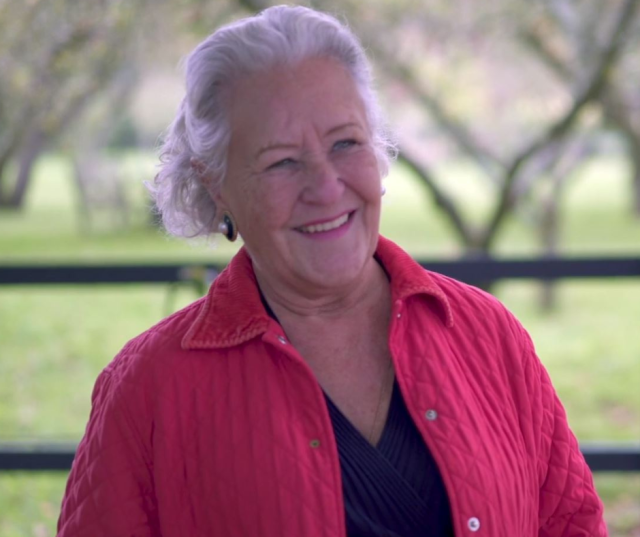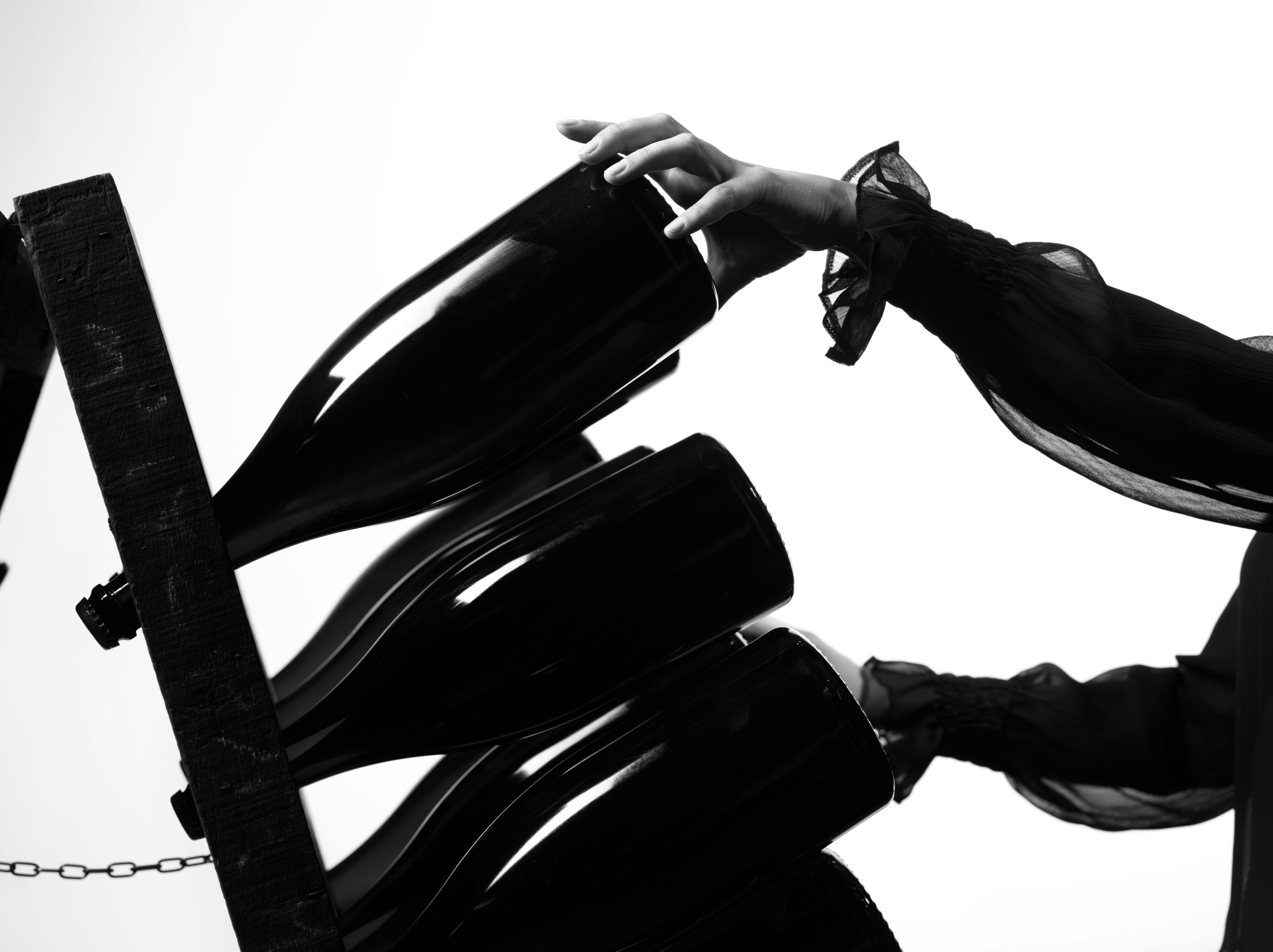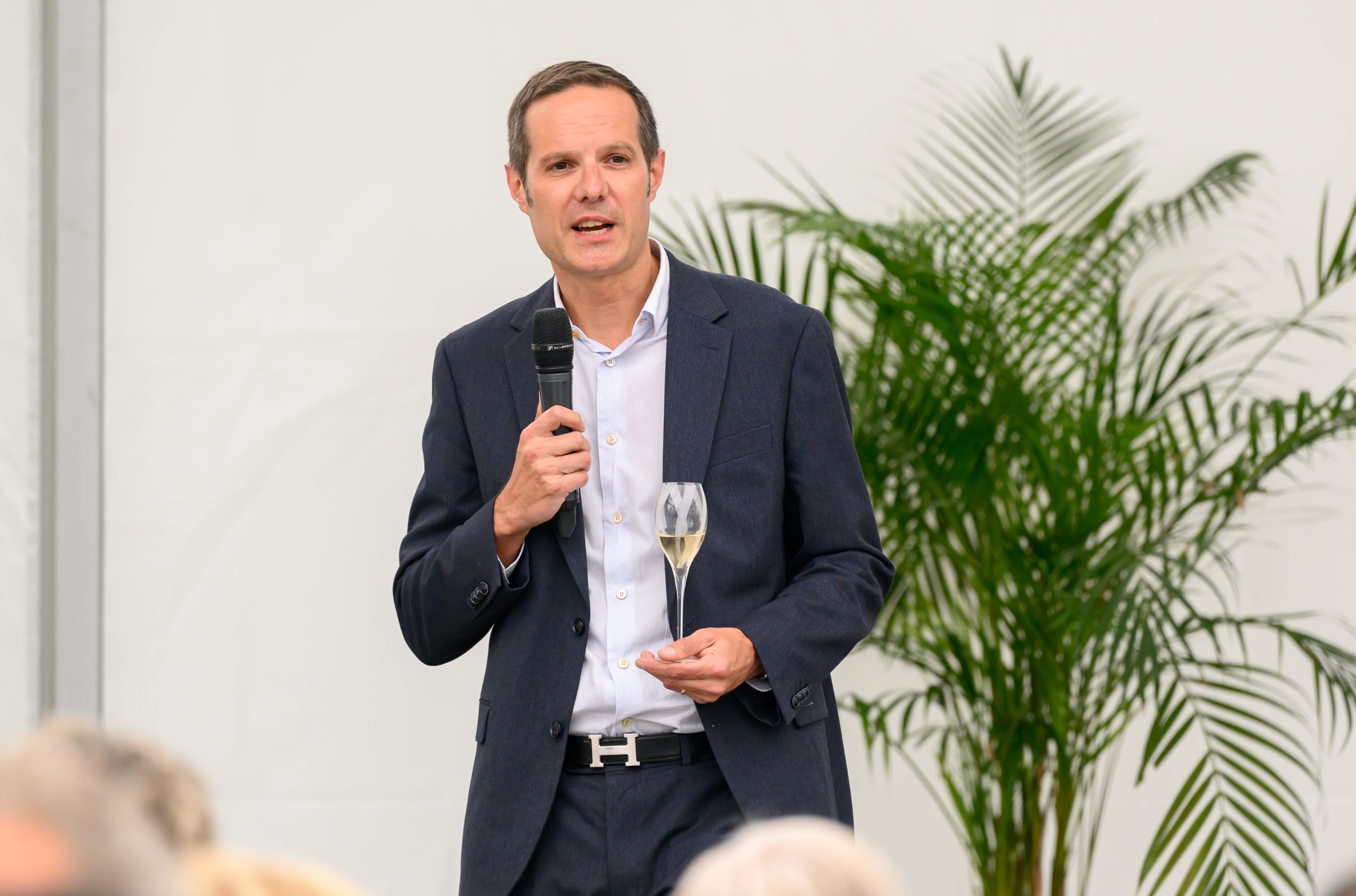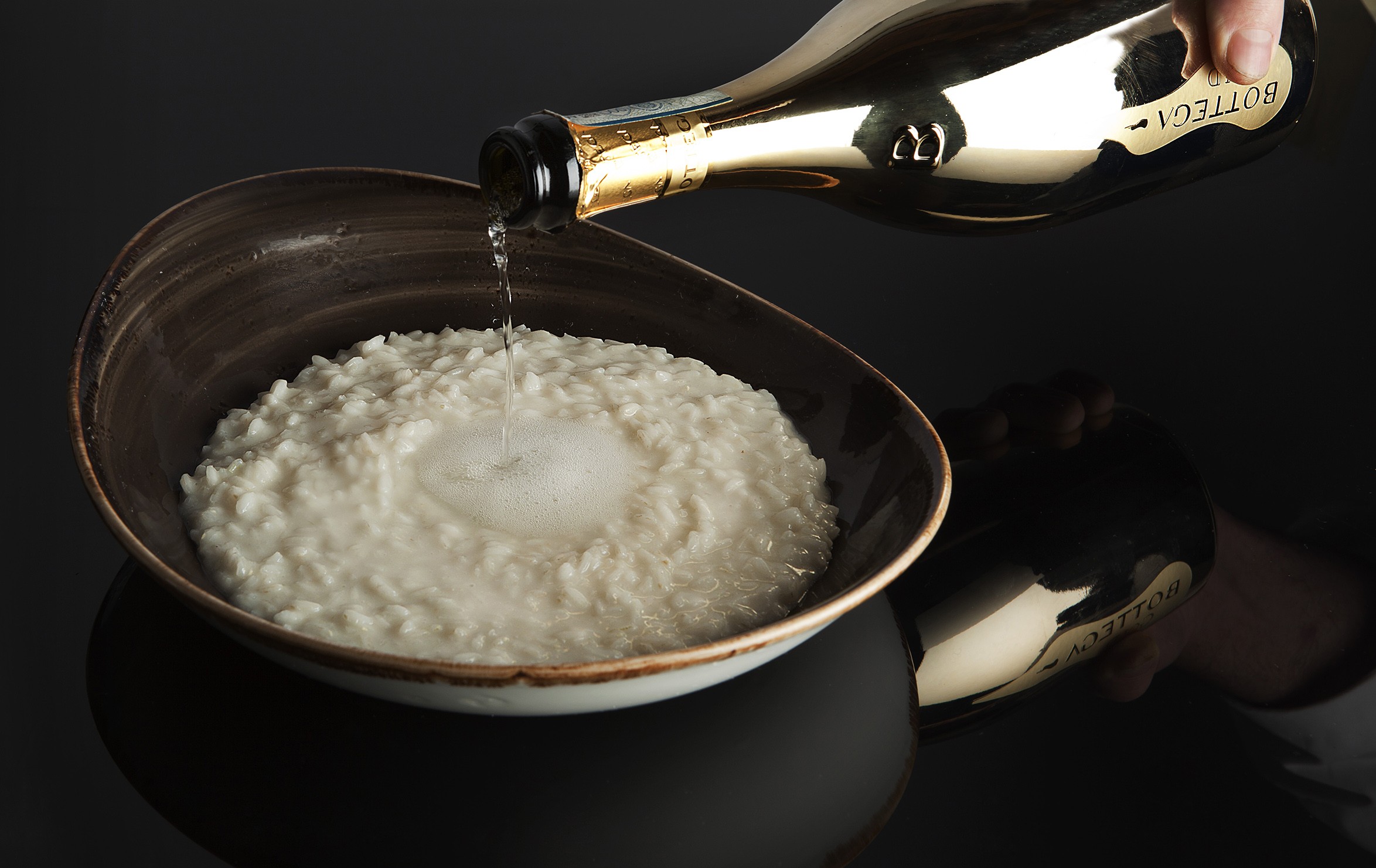Sarah Morphew Stephen MW: a eulogy
Following the death of Sarah Morphew Stephen MW on 13 June, aged 81, we reproduce the moving, funny and revelatory eulogy delivered at her funeral by her daughter, Lydia.

Sarah was especially notable in the wine trade for being the first woman to pass the MW examination, which she did in 1970, following which she became an active member of the IMW for many years.
She started her wine trade career in Porto; studied oenology at Bordeaux University – under the tutelage of Emile Peynaud – worked for Harvey’s of Bristol, and as a wine buyer for Asda, among many other roles in the drinks industry, including one as marketing director for Stowells of Chelsea at the time of the launch of the three-litre wine box.
After a move to Scotland with her husband, she opened Glasgow’s first wine warehouse, The Barrel Sélection, which later developed into an agency supplying wine to the Scottish wholesale trade.
Her funeral was her on 11 July at St Mary and St Peter’s, Kelsale Cum Carlton, where her daughter, Lydia Finney, gave the following address, which we have reproduced below with her blessing:
Where does one begin with a life as long, and full and vibrant as Sarah’s?
Happily, she did give us a head start with a comprehensive list of instructions for her funeral, which began with her heartfelt wish that her send-off be colourful, celebratory and fun. Very nearly every detail of today was a result of her specific requests. To echo someone else who knew and worked with Sarah “I never wanted for instruction.”
Many years ago Sarah declared, admittedly after a glass of wine or two, that she had decided that she would like a white coffin so that, in her words, everybody would know that she was ‘lily white and pure’…
Lily-white and pure are not the immediate adjectives I, or indeed anyone else would ascribe to Sarah. I think more fitting would be: vivacious, passionate, fearless, elegant, generous, fun, a whirlwind, an inspiration, a trailblazer, a dear friend, and unique.
Sarah was born Sarah Elizabeth Archer on the 30th May 1942 in Yeovil in Somerset, the only child of Jane and George Archer. Her parents owned and ran multiple shops and businesses in Essex, around the vicinity of Brentwood and Braintree. They were – together – extremely successful entrepreneurs.
Sarah’s father was, amongst his own business concerns, responsible for meat distribution in East Anglia during the War and later admitted – with his friend the local undertaker – to smuggling sides of beef in their hearse.
Her mother Jane was an asset to the businesses but her war work, which remains rather mysterious to this day, required her to be abroad often.
Her parents’ joint success made Sarah’s upbringing very comfortable, privileged and well-travelled. But it was also very lonely and emotionally deeply fractious. The absence of love and the insecurity of her childhood was something she carried with her all her life, and goes some way to explain her self-reliance, her determination to succeed and, perhaps above all, an enduring desire for safety and security.
Much changed for Sarah in going to boarding school at the age of 7 – the Convent of the Sacred Heart School in Tunbridge Wells.
At school Sarah found a family of friends she would keep close for the rest of her and their lives, including Annemary – Carmen – Deidre – Trisha who are all here today – her dear friend Madeleine who sadly died last December, and others who could not be with us today.
I’ll ask them later if they shared the “naughty dorm” with Sarah…..
Sarah always spoke warmly of the tutelage and direction of the nuns, but more so her absolute hatred of Games in all forms, but also midnight feasts, walking out of one window along the roof of the building and back in another, and apparently the senior girls had to sew their own hooded cloak as part of the uniform. They were highly desirable as they were very smart – as well as the ideal shape and length to smuggle in a flagon of cider in each hand undetected.
It was around the age of 11 that Sarah contracted Tuberculosis and, as part of her long recuperation spent extended time in Madeira, where she first helped with the vintage on the estate of family friends. It was there she caught the winemaking bug that would become her career and her fame.
She famously did not go to work with one illustrious Port producer, who told her curtly that, in their opinion, ‘there was no place in the Wine Trade for a Woman’ – but instead to the Portuguese company Adriano Ramos Pinto. I think it’s significant that Ramos Pinto had a history of being a disruptor and having a passion for experimentation and innovation.
From Porto she went on to University of Bordeaux to study Oenology and Viticulture before a series of ‘stages’ or apprenticeships across Europe, collecting fluency in Portuguese, French and German as she went, and – very nearly in Denmark – a husband.
But that relationship was not to be and instead of a life lived abroad, Sarah returned to England and continued her wine trade career as a qualified and experienced Wine Chemist. While her friends took on roles at art galleries and enjoyed years out, Sarah was employed with Harvey’s of Bristol, St James’s Bonded Warehouse in Bermondsey, and Brown and Pank, at the Stockwell bottling plant.
Her days in London were colourful. By day she supervised East End Women on the bottling line, breaking up fights when the gin-laced ladies took to broken bottles to settle their squabbles. By evening she was hosting dinner parties and attending glamourous dances in fashions of the day.
At some time in the late sixties she met businessman David Morphew. They married in 1969 and moved to Elizabeth Street in Devonport.
It was as Sarah Morphew she became known in the wine trade, passing in 1970 the prestigious Master of Wine exam, the first woman to do so, and it would be another six years before more women would join her.
Together, Sarah and David set up what was to be the first of many of her own enterprises: Westward Wines in Plymouth. This was alongside the demands of new motherhood when Simon was born in 1973.
Sadly the marriage was not to last and in 1975, with Simon aged 18 months, Sarah went to a new life in Yorkshire, again breaking through doors women had not been through before: jobs with very old-fashioned Brewers Sam Smiths; then the first female Wine and Spirits buyer for a UK supermarket ASDA – in charge of a budget of £1 million a week. Then back down to London in 1981 to work as Marketing Director for Stowell’s of Chelsea.
Also, sometime during this period, enter Stage Left my father Keith Stephen. Sarah and Keith had first met in the early 70s when Keith was a young naval officer, and Secretary of the Engineering College Wine Society for whom Sarah agreed to give a tasting.
A friendly onlooker of the time recalls that among the usual sounds at a wine tasting: the clinking of glasses and slurping of wine, could also be heard the sounds of Keith’s jaw hitting the deck on first meeting Sarah.
They remained friends but it was not until 1981 that she was finally persuaded to marry him, but only if he agreed to leave the Navy first, which he promptly did.
They married in St Olave’s in York in September 1982 and, somewhat to surprise all round, I arrived the following June.
A couple of years later the family moved to Scotland, first to Culross in Fife where Keith had been living before they had married then later to the secluded house Braeside on the banks of the river Forth.
Braeside became the venue for countless events which Sarah lavishly planned and hosted whether supper at the kitchen table – glamourous dinner parties in the dining room – or rambunctious parties for adults or children, almost all of which ended with a trip down the aerial runway.
The Halloween Party with a Ghost Tour through the dark woods was a memorable one – the children were delighted and the adults were terrified – or the dog birthday party she organised at my insistence for Petra the Labrador which included a ‘cake’ of pedigree chum boiled down and reformed into a mould, party games for the dogs and plenty of booze for the owners.
So many people have told me stories about first meeting Sarah.
My stepson James and his best friend Felix still regularly recall meeting her in a pub when they were 17 and within minutes of meeting them she was urging them be upfront in their own self-promotion and giving them her Top Tips in successfully navigating All Day Drinking.
Once you met Sarah, you never forgot her.
Our genteel retired neighbours at the top of the drive at Braeside, Colin and Kay Campbell, were particularly delighted to meet Sarah for the first time when she appeared wearing only bikini bottoms and holding me, then aged 2, entirely naked, the day they were giving a lovely garden party. The kind of garden party where ladies wore hats.
Partner Content
We had been out in the garden at home on a hot summer’s day – my father was abroad – a gust of wind had blown the door shut and locked us out. I’m sure there was no shortage of volunteers to help her carry a borrowed ladder back to the house so she could get up to an open upstairs window.
The things mum could achieve while dressed only in a bikini were pretty legendary. In the 90s staying in a house in Italy borrowed from friends, the gardens were infested with wasps nests and, in the chimney, a large hornet’s nest. Never one to let sensible advice to get in the way of a cunning plan, she took to the tiled roof one evening, barefoot and bikini- clad, armed with the poison powder. She realised too late however, as she shot the powder into the chimney that the hornets were still quite active despite the hour and that she had not accounted for the wind direction. Thus my father and I watched on, helpless as mum beat a retreat at speed across the roof, insect powder going everywhere, pursued by angry hornets. Later she would admit she had not taken adequate safety precautions and that all would have been well if only she had thought to tie a handkerchief around her nose and mouth…
What can be difficult to convey in a narrative of Sarah’s life is just now many plates she would spin at any one time. Sarah opened Glasgow’s first wine warehouse, The Barrel Selection, a large shop at busy St George’s Cross. Over time, the shop Cross developed into a business run from home supplying wine and whisky to the Scottish wholesale trade. I was often with her on her calls to hotels and restaurants across Scotland, driving everywhere at great speed in her red BMW, with a carphone the size of a house brick.
She was the Scottish Rep for prestigious brands such as Pol Roger Champagne, Springbank whisky, Hunter’s Wine’s in New Zealand, and cult Lebanese wine makers Chateau Musar. At the same time she was making wine in Chile and Argentina for the supermarket trade in the UK. She also became a fully qualified funeral director during this period.
It was also the time she survived her first cancers. Diagnosed with breast cancer first in 1989 described the horrors of early radiotherapy, and having a little camp-bed in the basement of the Barrel Selection shop so she could sleep after treatment and wake up already at work.
Sarah’s breast cancer returned in 1995 by which time we were living in Edinburgh and she was one foot in the wine trade, one foot in property development returning a 5 story Georgian Townhouse in Great King Street from business to residential and creating 3 flats. She’d set up a cleaning business called High Quality Housekeeping and was still leading TWITS trips around the world.
The TWITS were the Tremendous Wine Imbibers Travel Society, an exclusive, hand selected group of well off respectable retired folk who enjoyed wine – were prepared to pay for nice hotels and were – understandably devoted to my mother. She didn’t like to organise more than one wine trip per day for the TWITS and inserted plenty of cultural experiences, which included taking them to Disneyland while in California and a trip to a Balsamic vinegar factory in Italy – where everyone had to pretend to be food journalists as that’s how she’d secured their entry and tour.
That Mum survived to the age of 81 is nothing short of a miracle. She was also exceptionally lucky – and it really was a case of luck – to survive her next primary cancer. Diagnosed with endometriotic cancer in 2003 she was told in Edinburgh they couldn’t operate and would only offer palliative care.
How she felt about this we don’t know but, in any case, she and my father were divorcing – and she was leaving Edinburgh and moving to a cottage in Hinton Charterhouse, near Bath. It was through signing on with a new GP that she was referred to the Bath clinic who called her up and offered her a scan. “If it’s contained, we’ll treat it. If it has spread, we won’t.” That was, of course, some 20 years ago.
I think a piece of advice Sarah would always pass on to anyone with regard to their health is to never be afraid of advocating for yourself. She became, partly through necessity, very very good at it.
Sometime after her mastectomy she went back to her surgeon to complain the scar on her back had a bit that stuck out – caught on her clothing – and looked unsightly. The young man looked at it and mused “well if anyone saw that you’d think you were getting lucky!” She replied with full force “ and what makes you think I don’t want to get lucky?” He paled. Who wouldn’t -– and booked her in the following week. He later thanked her. “Sometimes we surgeons forget that our patients are people who have to live with results of our surgery.”
Her mantra was very much don’t let others dictate to you the value of your body.
And we all know how much her appearance was paramount to her: She requested that the first thing I should do when we came to see her in the High Dependency Unit following her operation for Pancreatic Cancer – her third primary cancer, in October 2021 – was to pencil her eyebrows on for her.
She always advocated for others too – she using her voice loudly at public meetings to speak against plans to move cancer services from Bath up to Bristol, which in the end, they did not.
Sarah found herself drawn back to Scotland in 2009 when an old friendship with wine trade chum Graeme Robertson rekindled into something rather more and she moved in with him at his home in East Lothian – whether he liked it or not. So relatively late in her life Sarah she had the joy of gaining another family in Graeme’s.
And in 2017 she took her foothold here in Kelsale to be near to me and my husband Mike. In those later years she preferred to tell people that she had grown up “near Suffolk” rather than to admit her Essex roots.
Sarah had a special ability to establish friends and allies in a new place. She instantly got involved in the community, through church flowers, getting people in for supper and drinks in the garden. And she kept friends to whom she was devoted.
Phone calls were her preferred medium to catch up and cards on your birthday. Mike and I may never succeed in remembering our own anniversaries now she has gone.
Mum learned in January this year her pancreatic cancer had spread to and was terminal. Her illnesses across the years left her no doubt in her mind and she elected not to have treatment but to live her final days to their fullest. Which she did, with trips to Italy with my brother – and to Portugal with Graeme – to Hampton Court and the Royal Opera House with me and Mike. And of course, a Valedictory Champagne Party in Scotland only 6 weeks ago.
When notifying everyone of her death I quipped that mum had died as she lived: at full speed. Which the multiple parking tickets and speeding fine she clocked up in her final weeks can confirm. Some may also remember the time she drove her convertible into a flood near bath and was left stranded – the water rising – not able to open the doors in the narrow lane enough to get out. The fire brigade had to rescue her and the two poodles out the top of the car. It made the local paper. She was absolutely delighted to finally get a Blue Badge which made all of her imaginative parking legal at last.
I would like to leave you with two stories which I think could also pass as advice from Sarah to you assembled here.
One is that No Entry signs – whatever form they take – should not be regarded as absolute barriers to entry. I recall the time we – Mum, Dad and I – were in Vancouver wandering around its most salubrious suburbs. Mum saw a private garden she was keen to look round and, much to my embarrassment, walked straight in. We were soon accosted by the gardener. Mum somehow worked out the man was Portuguese and launched into fluent conversation. He was delighted. Surprised but delighted. 10 minutes later we were having drinks with the owner of the house on his terrace with a fabulous view across Vancouver. No Entry is never an absolute barrier to entry if you’re gutsy enough.
The final story I will tell as mum conveyed to me.
In June last year Sarah returned to where her career began in Porto. She had been elevated to the rare and prestigious title of Infancao of the Confraria do Vinho do Porto in recognition of her lifelong contribution to the Port Wine Trade. This involved an elaborate ceremony and reception in some the grandest buildings of Porto, the delegates even escorted by military riders on horseback.
At the dinner she gave a speech bilingually in English and Portuguese to a room of 400, 500 people and told them how her career had so nearly not begun in Porto, but with tenacity – and talent – it had come full circle to this moment.
She received a standing ovation and she spent the rest of the evening being in selfies and being treated like star of the show she was. I was there, my brother was there, we were guests of Jorge Rosas, the son of her much-loved mentor from the beginning Jose Antonio Rosas. We would later haul her off the dancefloor at 3am.
At one point however I saw her sitting alone, quiet and thoughtful. I knelt down to be at her level and asked her if she was ok? She answered she was but – still serious – said she had something very important she needed to tell me. She took my hands and looked me straight in the eye. “Do you know Lydia the best thing I ever did? The very best thing I ever did? Was to go on a Public Speaking Course.”
I asked “really? Is that really the very best thing you ever did?” she thought about it for a moment more then and said “yes.”
I hope you will all take that very important advice on board.
There are two adjectives I didn’t use at the beginning that are really the most important in describing the Sarah we all knew and loved: unforgettable and irreplaceable.
Read more
You can read about Sarah’s life on her In Memoriam page on the Masters of Wine website.
There are also a couple of interviews with Sarah this decade, which can be accessed via the links below:
2022 Anne McHale MW in conversation with Sarah Morphew Stephen MW
2020 Awards Ceremony – 50th anniversary interview
Related news
For the eleventh day of Christmas...




